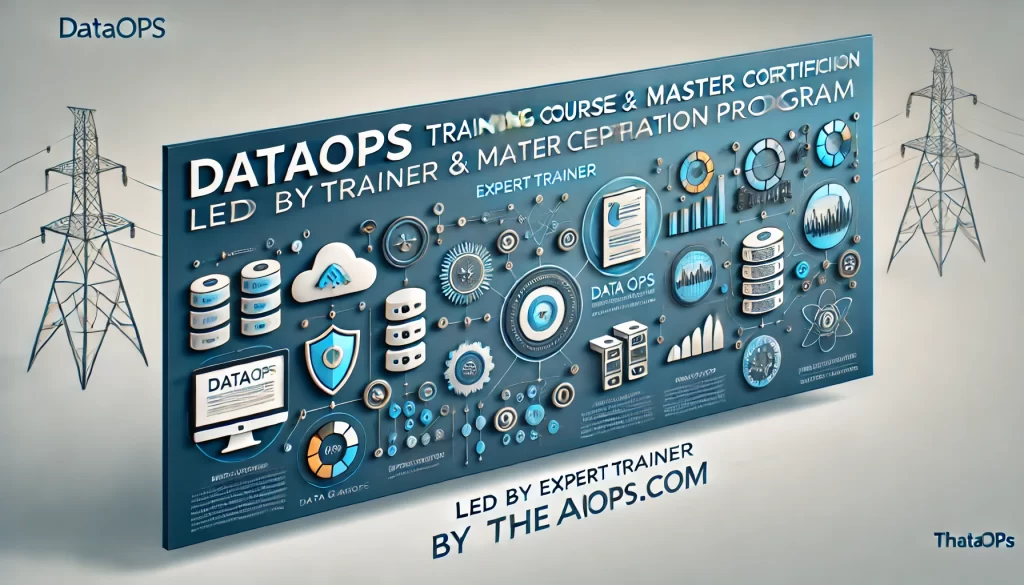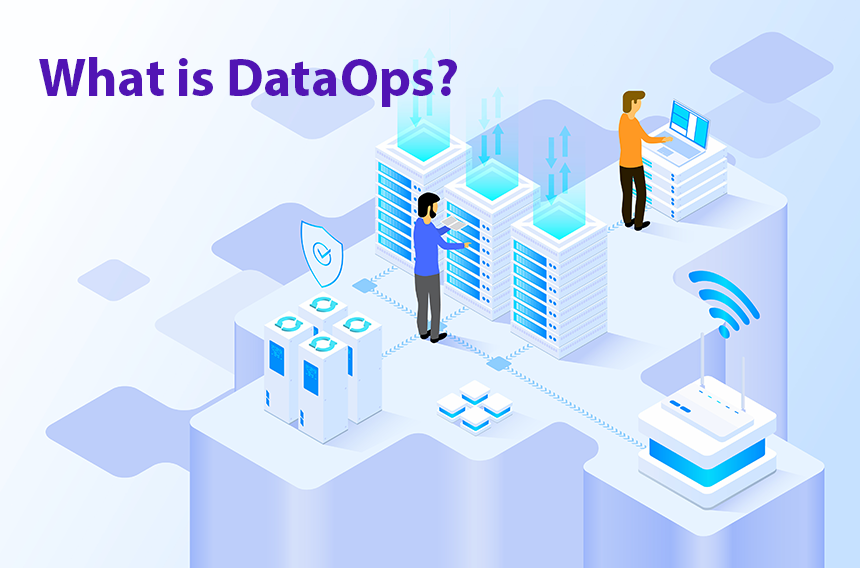
The DataOps Training Course & Master Certification Program by theaiops.com is a comprehensive training designed to empower data professionals, engineers, and analysts with the skills needed to implement DataOps practices for efficient data management and analytics. Led by expert trainer Rajesh Kumar from RajeshKumar.xyz, this course dives deep into DataOps methodologies that streamline the data lifecycle, enabling teams to build reliable, automated, and scalable data pipelines. Participants learn hands-on techniques for orchestrating data workflows, improving data quality, and enhancing collaboration between data and IT teams. By the end of the program, learners are prepared for the DataOps Master Certification, which validates their expertise in this emerging field. This training equips professionals to drive data-driven transformation within their organizations, making data operations faster, more flexible, and aligned with agile and DevOps principles to meet today’s business demands for real-time, high-quality data insights.
What is DataOps?

DataOps, or Data Operations, is a modern approach to managing the end-to-end data lifecycle, aimed at improving the speed, quality, and reliability of data analytics. Drawing from principles of DevOps, agile, and lean methodologies, DataOps fosters collaboration between data engineers, analysts, and IT teams, enabling them to deliver high-quality data and insights more efficiently. DataOps focuses on automating data workflows, ensuring data quality, and reducing the friction often associated with traditional data processes. By implementing DataOps, organizations can manage complex data pipelines, enhance data integration, and support real-time analytics, ultimately making data-driven decision-making more accessible and effective. This approach not only increases the agility of data teams but also aligns data management practices with business objectives, supporting continuous innovation and responsiveness in today’s data-driven landscape.
Why DataOps is Important
In today’s digital landscape, data is everything. It drives decision-making, supports customer engagement, and informs strategic initiatives. But as organizations generate more data, managing it becomes increasingly challenging. Here’s where DataOps plays a pivotal role:
- Improved Data Quality: DataOps emphasizes automated validation and quality checks to ensure data is accurate and reliable. Poor data quality leads to incorrect insights, which can harm business decisions and outcomes.
- Faster Time-to-Insight: DataOps helps streamline data delivery, making information accessible faster. By reducing bottlenecks, organizations can make timely, data-driven decisions.
- Increased Collaboration: DataOps fosters a culture of collaboration between data engineers, analysts, and operations teams, ensuring that everyone works from the same playbook. This reduces errors and aligns teams toward a common goal.
- Agility and Scalability: With automated pipelines and data workflows, organizations can respond quickly to changing demands and scale their operations effectively. DataOps practices make it easier to adapt to evolving technology stacks and business needs.
- Reduced Operational Costs: By automating repetitive tasks and optimizing workflows, DataOps helps reduce manual work, freeing up resources for more valuable tasks.
Course Features
This DataOps course at theaiops.com is designed for hands-on learning and practical application, ensuring that you gain the knowledge and skills to implement DataOps practices effectively. Here’s what sets our course apart:
- Comprehensive Curriculum: Covering the fundamentals of DataOps, pipeline management, data quality, and automation, this course provides a full understanding of the DataOps landscape and its practical applications.
- Real-World Case Studies and Projects: You’ll work through projects and case studies inspired by real-world DataOps implementations, gaining insight into how leading organizations have benefited from DataOps.
- Hands-On Lab Sessions: With structured labs for tools like Apache Airflow, Prometheus, and Great Expectations, you’ll practice building, monitoring, and troubleshooting data pipelines in real-world scenarios.
- Lifetime Access to Learning Materials: From lecture notes and recorded videos to software setup guides and resources, you’ll have lifetime access to course materials, allowing you to revisit and refresh your skills anytime.
- Learning from Industry Experts: Led by Rajesh Kumar, a seasoned DataOps practitioner, this course offers you insights and mentorship from someone who has applied DataOps principles in a wide range of industries, ensuring you gain practical knowledge and skills.
Training Objectives
By the end of this course, you’ll be well-prepared to lead DataOps initiatives and manage complex data workflows effectively. Specific objectives include:
- Design and Implement Data Pipelines: Learn to create end-to-end data pipelines using DataOps principles, from data ingestion to transformation and distribution.
- Automate and Orchestrate Data Workflows: Gain expertise in tools like Apache Airflow to automate repetitive tasks, optimize data flow, and monitor pipeline performance.
- Ensure Data Quality and Reliability: Use tools like Great Expectations to automate data validation, creating a reliable foundation for data analytics and decision-making.
- Integrate Version Control and CI/CD: Apply DevOps best practices to data workflows, enabling collaborative development, automated testing, and rapid iteration.
- Monitor and Troubleshoot Pipelines: Develop the skills to set up monitoring and observability frameworks, ensuring smooth data flow and immediate problem detection.
Target Audience
This DataOps course is perfect for:
- Data Engineers and Data Scientists: Gain the skills to streamline data workflows, reduce manual intervention, and improve data quality in your organization.
- Data Analysts: DataOps skills enable analysts to ensure the data they work with is clean, reliable, and ready for analysis, leading to more accurate insights.
- DevOps Engineers: Transition from traditional DevOps practices to DataOps, gaining expertise in managing data-centric workflows and automating data pipeline deployments.
- IT Managers and Data Architects: Oversee data operations with confidence, ensuring data is efficiently managed and ready for use in analytics and machine learning.
- Business Intelligence and Analytics Teams: Accelerate time-to-insight and improve data quality for dashboards, reports, and analytics.
Training Methodology
This course combines theory with immersive, hands-on exercises to create a well-rounded learning experience:
- Conceptual Lectures: Each module begins with lectures covering core principles, tools, and best practices in DataOps. These sessions provide a deep understanding of DataOps and its application in various industries.
- Interactive Labs and Exercises: Participants will engage in lab sessions designed to reinforce theoretical concepts with practical experience. You’ll build data pipelines, configure monitoring systems, and troubleshoot issues in a controlled environment.
- Group Discussions and Q&A Sessions: Interactive Q&A sessions and group discussions allow you to ask questions, gain new perspectives, and apply knowledge through collaborative problem-solving.
- Assignments and Quizzes: Regular assignments and quizzes help you solidify your learning and gauge your progress, preparing you for real-world application.
Certification Program
After completing the course, you’ll earn a DataOps Certification from DevOpsSchool.com, which validates your skills in DataOps and can help advance your career:
- Globally Recognized Certification: Your certification is backed by DevOpsSchool.com, showcasing your proficiency in DataOps principles, tools, and methodologies.
- Digital Badge for Professional Profiles: Share your achievement on LinkedIn, your resume, or other platforms with a digital badge, making your skills visible to employers and peers.
- Lifetime Access to Certification Resources: As a certified DataOps practitioner, you’ll have access to materials, updates, and additional resources to help you stay up-to-date as the field evolves.
Agenda of the DataOps Training Program
Day 1: Introduction to DataOps and Building Data Pipelines
- Overview of DataOps: Introduction to the concept, goals, and benefits of DataOps.
- Data Integration and ETL Fundamentals: Learn about data ingestion, transformation, and the role of ETL in DataOps.
- Hands-On Lab: Setting up a basic ETL pipeline with Talend, transforming data for analysis.
Day 2: Automating and Orchestrating Data Workflows
- Orchestration with Apache Airflow: Explore Airflow’s capabilities for scheduling and managing workflows, including handling dependencies and retries.
- Monitoring and Observability: Set up Prometheus and Grafana to track pipeline health and receive alerts.
- Hands-On Lab: Build and manage a multi-step data pipeline with Airflow, setting up monitoring for real-time tracking.
Day 3: Data Quality and CI/CD for DataOps
- Data Quality Assurance with Great Expectations: Understand the importance of data validation and profiling to maintain reliable data pipelines.
- CI/CD in Data Workflows: Learn how to use Git and Jenkins to automate testing, deployment, and version control for data pipelines.
- Hands-On Lab: Configure data quality checks with Great Expectations and set up a CI/CD workflow with Jenkins for your data pipeline.
Lab Setup
To participate in labs and hands-on exercises, you’ll need:
- A laptop or computer with at least 8GB of RAM: This ensures smooth running of data tools and platforms.
- Required Software: You’ll install Talend, Apache Airflow, Prometheus, Grafana, Git, Jenkins, and Great Expectations.
- Cloud Access (Optional): Participants can use cloud platforms like AWS, GCP, or Azure for certain labs, though local setups will be available for those without cloud access.
- Step-by-Step Setup Guide: Detailed instructions for installing and configuring each tool, ensuring a seamless experience with the hands-on labs.
Trainers
Your trainer for this course is Rajesh Kumar, an experienced DataOps and data engineering expert. Rajesh has spent years designing and managing data workflows for large-scale organizations, and his expertise in DataOps ensures that you’ll gain practical, actionable knowledge. Rajesh’s teaching style emphasizes real-world applications, ensuring that the skills you learn are immediately applicable.
Frequently Asked Questions (FAQ)
- Who is this course for?
- This course is designed for data engineers, analysts, DevOps professionals, and anyone looking to work with DataOps.
- What prior knowledge do I need?
- Familiarity with data workflows and basic understanding of SQL or Python is helpful but not required.
- Will I learn hands-on skills?
- Yes, each module includes labs where you’ll work directly with DataOps tools.
- How is DataOps different from traditional data management?
- DataOps introduces automation, collaboration, and CI/CD principles to data workflows, unlike traditional methods.
- Do I need to know how to code?
- Coding isn’t necessary, though some familiarity with SQL or scripting languages will help.
- Can I implement these skills immediately?
- Yes, the course is designed to provide practical, job-ready skills.
- Will there be post-course support?
- Yes, lifetime access to materials and a supportive community for any questions or further learning.
- Is DataOps applicable in my industry?
- Absolutely. DataOps principles can improve data processes across industries, from finance to healthcare.
- What tools will I learn?
- Tools like Talend, Apache Airflow, Great Expectations, Git, Jenkins, and more.
- How does DataOps improve data quality?
- Through automated checks and validations, ensuring reliable data for analytics.
- Will I receive certification?
- Yes, upon completion, you’ll receive a certification from DevOpsSchool.com.
- Is this course beginner-friendly?
- Yes, while prior experience helps, the course is designed to be accessible.
- Do you cover cloud DataOps tools?
- Yes, cloud integrations with AWS, GCP, and Azure are included.
- What support is available for labs?
- Our team provides detailed setup guides and troubleshooting assistance.
- Will I have lifetime access to resources?
- Yes, you’ll have ongoing access to course materials and updates.
